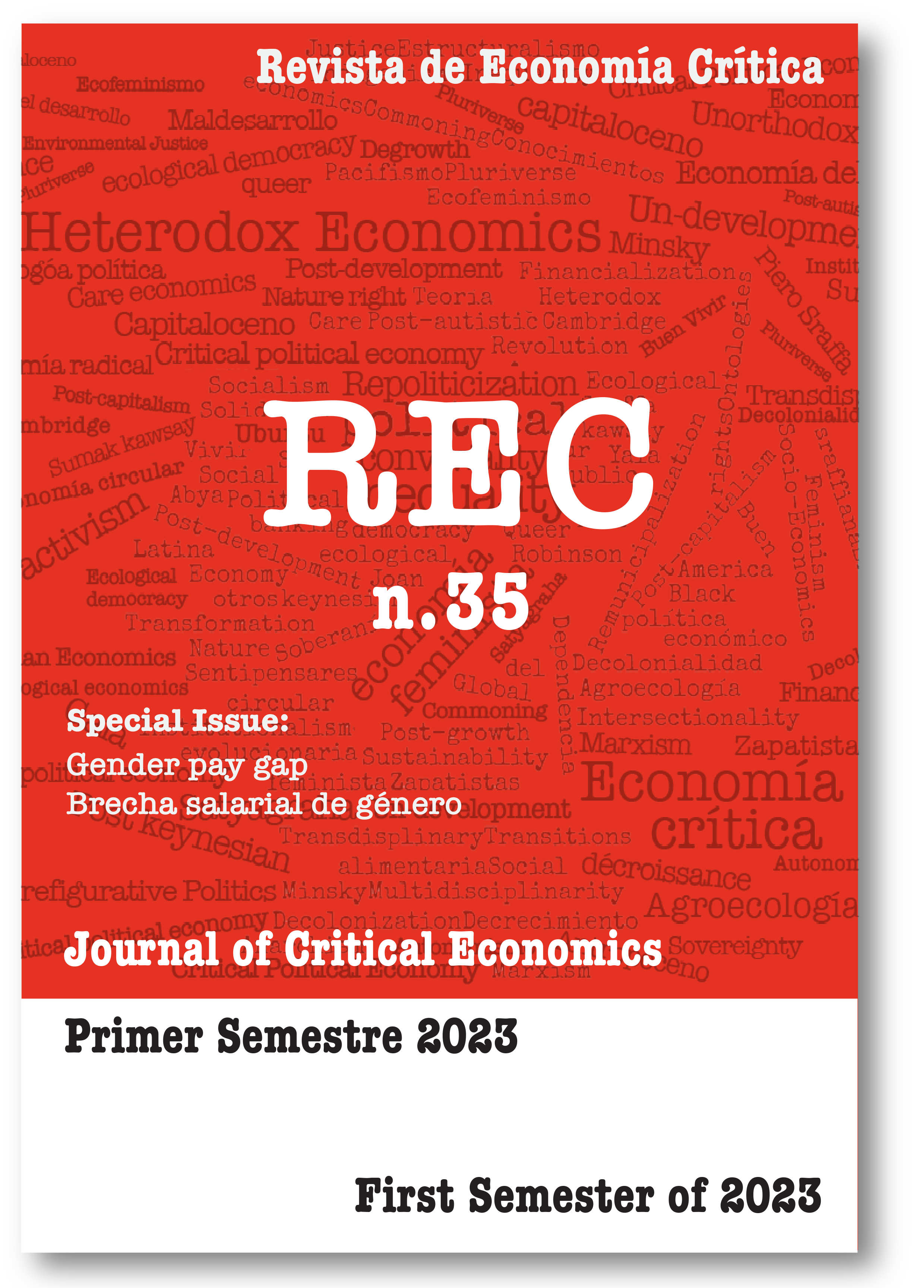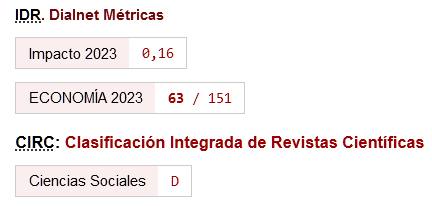Especulación, paradigma y currículo
DOI:
https://doi.org/10.46661/rec.8964Palabras clave:
reforma de la Economía, especulación financiera, inestabilidad financieraResumen
En este artículo analizamos el papel que ocupa el estudio de las causas y las consecuencias de la especulación financiera en la formación de los economistas. Siguiendo la metodología desarrollada por T. S. Kuhn en sus numerosas obras, indagamos en los libros de texto universitarios, herramienta privilegiada para conocer el currículo de la profesión. Nuestras investigaciones sugieren que a pesar del enconado debate científico y académico que tuvo lugar a lo largo del siglo XX, la Academia ha sido incapaz de integrar el análisis de los elementos especulativos en el paradigma económico vigente.
Descargas
Citas
Allington, Nigel F. B.; McCombie, John S. L. y Pike, Maureen (2011). The Failure of New Macroeconomic Consensus: from Non - Ergodicity to the Efficient Market Hypothesis and Back Again. International Journal of Public Policy, vol. 7, nº 1,2,3, pp. 4-21. https://doi.org/10.1504/IJPP.2011.039572 DOI: https://doi.org/10.1504/IJPP.2011.039572
Allington, Nigel F. B.; McCombie, John S. L. y Pike, Maureen (2012). Lessons not Learned: from the Collapse of Long-Term Capital Management to the Subprime Crisis. Journal of Post Keynesian Economics, vol. 34, No. 4, pp. 555-582. https://doi.org/10.2753/PKE0160-3477340401 DOI: https://doi.org/10.2753/PKE0160-3477340401
Arrow, Kenneth Joseph (1964). The Role of Securities in the Optimal Allocation of Risk - Bearing. The Review of Economic Studies, vol. 31, nº 2, pp. 91-96. https://doi.org/10.2307/2296188 DOI: https://doi.org/10.2307/2296188
Arrow, Kenneth Joseph (1971). Essays in the Theory of Risk Bearing. Amsterdam, The Netherlands: North - Holland Pub. Co.
Baumol, William Jack (1957). Speculation, Profitability and Stability. The Review of Economics and Statistics, vol. 39, nº 3, pp. 263-271. https://doi.org/10.2307/1926042 DOI: https://doi.org/10.2307/1926042
Blanchard, Olivier (2000). What Do We Know about Macroeconomics that Fisher and Wicksell Did Not?. The Quarterly Journal of Economics, vol. 115, n. 4, pp. 1375-1409. https://doi.org/10.3386/w7550 DOI: https://doi.org/10.1162/003355300554999
Blanchard, Olivier; Dell'Ariccia, Giovanni y Mauro, Paolo (2010). Rethinking Macroeconomic Policy. IMF Staff Position Note 10/03, Washington. https://doi.org/10.5089/9781455224982.004.A001 DOI: https://doi.org/10.5089/9781455224982.004.A001
Blaug, Mark (1994). Why I am not a Constructivist: Confessions of an Unrepentant Popperian. En Roger E. Backhouse (Ed.), New Directions in Economic Methodology (1ª edición, pp. 109-136). London, England: Routledge. https://doi.org/10.4324/9780203204085.pt2 DOI: https://doi.org/10.4324/9780203204085.pt2
Blinder, Alan (2010). Teaching Macro Principles after the Financial Crisis. The Journal of Economic Education, vol. 41, nº 4, pp. 385-390. https://doi.org/10.1080/00220485.2010.510394 DOI: https://doi.org/10.1080/00220485.2010.510394
Bofinger, Peter (2011). Teaching Macroeconomics after the Crisis. Würzburg Economic Papers, nº 8, Wirtschaftswissenschaftliche Fakultät, Universität Würzburg.
Boulding, Kenneth Ewart (1991). What is Evolutionary Economics?. Journal of Evolutionary Economics, vol. 1, pp. 9-17. https://doi.org/10.1007/BF01202334 DOI: https://doi.org/10.1007/BF01202334
Bradford De Long, James; Shleifer, Andrei; Summers, Lawrence Henry y Waldmann, Robert J. (1990). Positive Feedback Investment Strategies and Destabilizing Rational Speculation. The Journal of Finance, vol. XLV, nº 2, pp. 379-395. https://doi.org/10.1111/j.1540-6261.1990.tb03695.x DOI: https://doi.org/10.1111/j.1540-6261.1990.tb03695.x
British Academy (2009). The Global Crisis - Why didn't anybody notice?. Revista de Economía Institucional, nº 21, pp. 247-251. Recuperado de https://www.thebritishacademy.ac.uk/publishing/review/14/british-academy-review-global-financial-crisis-why-didnt-anybody-notice/
Brue, Stanley y MacPhee, Craig (1995). From Marx to Markets: Reform of the University Economics Curriculum in Russia. The Journal of Economic Education, vol. 26, nº 2, pp. 182-194. https://doi.org/10.1080/00220485.1995.10844870 DOI: https://doi.org/10.1080/00220485.1995.10844870
Brunetti, Celso; Büyükşahin, Bahattin y Harris, Jeffrey (2016). Speculators, Prices and Market Volatility. Journal of Financial and Quantitative Analysis, vol. 51, nº 5, pp. 1545-1574. https://doi.org/10.1017/S0022109016000569 DOI: https://doi.org/10.1017/S0022109016000569
Buiter, Willem Hendrik (2009). The Unfortunate Uselessness of Most State of the Art Academic Monetary Economics. MPRA Archives nº 58.407.
Bunge, Mario (1972). Teoría y Realidad. Barcelona, España: Ariel.
Carrick-Hagenbarth, Jessica y Epstein, Gerald A. (2012). Dangerous Interconnectedness: Economists' Conflicts of Interest, Ideology and Financial Crisis. Cambridge Journal of Economics, vol. 36, pp. 43-63. https://doi.org/10.1093/cje/ber036 DOI: https://doi.org/10.1093/cje/ber036
Colander, David (2009). Introduction to Symposium on the Financial Crisis and the Teaching of Macroeconomics. The Journal of Economic Education, vol. 41, nº 4, pp. 383-384. https://doi.org/10.1080/00220485.2010.510395 DOI: https://doi.org/10.1080/00220485.2010.510395
Colander, David; Goldberg, Michael; Haas, Armin; Juselius, Katarina; Kirman, Alan; Lux, Thomas; Sloth, Brigitte (2009). The Financial Crisis and the Systemic Failure of the Economics Profession. Critical Review, vol. 21 (2-3), pp. 249-267. https://doi.org/10.1080/08913810902934109 DOI: https://doi.org/10.1080/08913810902934109
Coley, Diane (2012). Are Economics Graduates Fit for Purpose? Recuperado de https://voxeu.org/article/are-economics-graduates-fit-purpose.
Coley, Diane (2014). The Mainstream Economics Curriculum Needs an Overhaul. Recuperado de https://voxeu.org/article/mainstream-economics-curriculum-needs-overhaul.
Davies, Glyn (2002). A History of Money. Cardiff, Reino Unido: University of Wales Press.
Debreu, Gerard (1959). Theory of Value. Monograph nº 17, Cowles Commission for Research in Economics, Yale University Press.
Di Maggio, Marco (2016). Market Turmoil and Destabilizing Speculation. Columbia Business School Research Paper, 13.
Emery, Henry Crosby (1896). Speculation on the Stock and Produce Exchanges of the United States. New York, United States: The Faculty of Political Science of Columbia University in the City of New York.
Fama, Eugene (1970). Efficient Capital Markets: A Review of Theory and Empirical Work. Journal of Finance, vol. 25, nº 2, pp. 383-417. https://doi.org/10.2307/2325486 DOI: https://doi.org/10.1111/j.1540-6261.1970.tb00518.x
Farrell, Michael J. (1966). Profitable Speculation. Economica, New Series; vol. 33, nº 130, pp. 183-193. https://doi.org/10.2307/2552611 DOI: https://doi.org/10.2307/2552611
Feiger, George (1976). What is Speculation?. The Quarterly Journal of Economics, vol. 90, nº 4, pp. 677-687. https://doi.org/10.2307/1885329 DOI: https://doi.org/10.2307/1885329
Flórez Quintero, Daian Tatiana (2007). ¿Es la Inconmensurabilidad Incomparabilidad?. Discusiones Filosóficas, nº 11, pp. 49-60.
Franco de los Ríos, Camilio Andrés (2005). El Formalismo Axiomático en Economía. Cuadernos de Economía, vol. XXIV, nº 43, pp. 35-63.
Friedman, Milton (1953a). The Case for Flexible Exchange Rates. En Milton Friedman (Ed.) Essays in Positive Economics. (pp. 157-203), Chicago, United States: The University of Chicago Press.
Friedman, Milton (1953b). Essays in Positive Economics. Chicago, United States: The University of Chicago Press.
Friedman, Benjamin (2010). Reconstructing Economics in Light of the 2007 - ? Financial Crisis. The Journal of Economics Education, vol. 41, nº 4, pp. 391-397. https://doi.org/10.1080/00220485.2010.510397 DOI: https://doi.org/10.1080/00220485.2010.510397
Gazda, Jakub; Marszalek, Pawel y Szarzec, Katarzyna (2021). The Determinants of Financialization. A Bayesian Approach. Revista de Economía Mundial, vol. 59, pp. 221-242.
Giraud, Yann (2017). The Contestable Marketplace of Ideas: Paul Samuelson's Defense of Mainstream Economics through Textbook Making, 1967-1976. THEMA Working Paper 2017/19 Université de Cergy - Pontoise, France. https://doi.org/10.2139/ssrn.3009252 DOI: https://doi.org/10.2139/ssrn.3009252
Glahe, Fred (1966). Professional and Nonprofessional Speculation, Profitability and Stability. Southern Economic Journal, vol. 33, nº 1, pp. 43-48. https://doi.org/10.2307/1055988 DOI: https://doi.org/10.2307/1055988
Goetz, Cole, Miljkovic, Dragan y Barabanov, Nikita (2021). New Empirical Evidence in Support of the Theory of Price Volatility of Storable Commodities under Rational Expectations in Spot and Futures Markets. Energy Economics. https://doi.org/10.1016/j.eneco.2021.105375 DOI: https://doi.org/10.1016/j.eneco.2021.105375
Gray, Jerry D. y Miller, Michael (2011). Intermediate Macro Text and the Economic Crisis of 2008 - 2009. International Review of Economic Education, vol. 10, nº 11, pp. 133-147. https://doi.org/10.1016/S1477-3880(15)30033-5 DOI: https://doi.org/10.1016/S1477-3880(15)30033-5
Hart, Oliver D'Arcy (1977). On the Profitability of Speculation. The Quarterly Journal of Economics, vol. 91, nº 4, pp. 579-597. https://doi.org/10.2307/1885883 DOI: https://doi.org/10.2307/1885883
Hart, Oliver D'Arcy y Kreps, David M. (1986). Price Destabilizing Speculation. Journal of Political Economy, vol. 94, nº 5, pp. 927-952. https://doi.org/10.1086/261418 DOI: https://doi.org/10.1086/261418
Hicks, John Richard (1939), Value and Capital. Oxford, England: The Clarendon Press.
Hirshleifer, Jack (1975). Speculation and Equilibrium: Information, Risk and Markets. The Quarterly Journal of Economics, vol. LXXXIX, nº 4, pp. 519-542. https://doi.org/10.2307/1884690 DOI: https://doi.org/10.2307/1884690
Hirshleifer, Jack (1977). The Theory of Speculation under Alternative Regimes of Markets. The Journal of Finance, vol. 32, nº 4, pp. 975-999. https://doi.org/10.1111/j.1540-6261.1977.tb03304.x DOI: https://doi.org/10.1111/j.1540-6261.1977.tb03304.x
Irwin, Harold Speer (1937). The Nature of Risk Assumption in the Trading on Organized Exchanges. The American Economic Review; vol. 27, nº 2, pp. 267-278.
Kaldor, Nicholas (1939). Speculation and Economic Stability. The Review of Economic and Statistics, vol. 7, nº 1, pp. 1-27. https://doi.org/10.2307/2967593 DOI: https://doi.org/10.2307/2967593
Kahneman, Daniel (2012). Pensar rápido, pensar despacio. Barcelona, España: Editorial Debate.
Keen, Steve (1995). Finance and Economic Breakdown: Modeling Minsky's "Financial Instability Hypothesis". Journal of Post Keynesian Economics, vol. 17, nº 4, pp. 607-635. https://doi.org/10.1080/01603477.1995.11490053 DOI: https://doi.org/10.1080/01603477.1995.11490053
Keen, Steve (2013). A Monetary Minsky Model of the Great Moderation and the Great Recession. Journal of Economic Behavior and Organization, vol. 86, pp. 221-235. https://doi.org/10.1016/j.jebo.2011.01.010 DOI: https://doi.org/10.1016/j.jebo.2011.01.010
Keynes, John Maynard (1930). Treatise on Money. London, England: Macmillan and Co.
Keynes, John Maynard (1936). The General Theory of Employment, Interest and Money. Harcourt, New York [edición en castellano (1991): Teoría General de la Ocupación, el Interés y el Dinero. México: Fondo de Cultura Económica].
Kindleberger, Charles (1978). Manías, Pánicos y Cracs. Historias de las Crisis Financieras. Barcelona, España: Ariel Economía.
Kohn, Meir (1978). Competitive Speculation. Econometrica, vol. 46, nº 5, pp. 1061-1076. https://doi.org/10.2307/1911436 DOI: https://doi.org/10.2307/1911436
Koopmans, Tjalling (1980). Tres Ensayos sobre el Estado de la Ciencia Económica. Barcelona, España: Antoni Bosch, editor.
Krippner, Greta (2005). The Financialization of the American Economy. Socio-Economic Review, nº 3, pp. 173-208. https://doi.org/10.1093/SER/mwi008 DOI: https://doi.org/10.1093/SER/mwi008
Kuhn, Thomas Samuel (1962a). The Structure of Scientific Revolutions. University of Chicago Press [edición en castellano (2001): La Estructura de las Revoluciones Científicas. Madrid, España: Fondo de Cultura Económica].
Kuhn, Thomas Samuel (1962b). Historical Structure of Scientific Discovery. Science; vol. 136, nº 3518, pp. 760-764. https://doi.org/10.1126/science.136.3518.760 DOI: https://doi.org/10.1126/science.136.3518.760
Kuhn, Thomas Samuel (1969). Posdata: 1969. En Thomas S. Kuhn, La estructura de las Revoluciones Científicas. Madrid, España: Fondo de Cultura Económica.
Kuhn, Thomas Samuel (1973). Objetividad, Juicios de Valor y Elección de Teoría. En Thomas S. Kuhn, La Tensión Esencial. Madrid, España: Fondo del Cultura Económica.
Kuhn, Thomas Samuel (1980). La función del dogma en la investigación científica. Cuadernos Teorema, Universidad de Valencia.
Kuhn, Thomas Samuel (1983). La Tensión Esencial. Madrid, España: Fondo de Cultura Económica.
Lapavitsas, Costas (2016). Beneficios sin Producción. Cómo nos Explotan las Finanzas. Madrid, España: Editorial Traficantes de Sueños.
Leach, John (1991). Rational Speculation. Journal of Political Economy, vol. 99, nº 1, pp. 131-144. https://doi.org/10.1086/261743 DOI: https://doi.org/10.1086/261743
Leeman, Wayne (1949). An Evaluation of Organized Speculation. Southern Economic Journal, vol. 16, nº 2, pp. 139-146. https://doi.org/10.2307/1054563 DOI: https://doi.org/10.2307/1054563
Lucas, Robert Emerson (1972). Expectations and Neutrality of Money. Journal of Economic Theory, vol. 4, pp. 103-124. https://doi.org/10.1016/0022-0531(72)90142-1 DOI: https://doi.org/10.1016/0022-0531(72)90142-1
Madrid, Alberto y Hierro, Luis (2015). Burbujas Especulativas: el Estado de una Cuestión poco Estudiada. Cuadernos de Economía, vol. 38, pp. 123-138. https://doi.org/10.1016/j.cesjef.2015.05.001 DOI: https://doi.org/10.1016/j.cesjef.2015.05.001
Madsen, Poul Tois (2013a). The Impact of the Financial Crisis on the Content of Twelve Bestselling US Principles of Economics Textbooks - Cosmetic or Real Changes?, SSRN Electronic Journal, January. https://doi.org/10.2139/ssrn.2203749 DOI: https://doi.org/10.2139/ssrn.2203749
Madsen, Poul Tois (2013b). The Financial Crisis and Principles of Economics. The Journal of Economic Education, vol. 44, nº 3, pp. 197-216. https://doi.org/10.1080/00220485.2013.795450 DOI: https://doi.org/10.1080/00220485.2013.795450
Malinvaud, Edmond (1985). Lectures on Microeconomics Theory. Amsterdam, The Netherlands: North - Holland.
Mankiw, Nicholas Gregory (2020). Reflections of a Textbook Author. Journal of Economic Literature, vol. 58 (1), pp. 215-228. https://doi.org/10.1257/jel.20191589 DOI: https://doi.org/10.1257/jel.20191589
Marshall, Alfred (1907). The Social Possibilities of Economic Chivalry. The Economic Journal, 17(65), pp. 7-29. https://doi.org/10.2307/2220775 DOI: https://doi.org/10.2307/2220775
McCloskey, Deirdre N. (1998). The Rhetoric of Economics. Madison, United States: The University of Wisconsin Press.
Mill, John Stuart (1848). Principles of Political Economy with some of their Applications to Social Philosophy. London, England: John W. Parker ed., London [edición en castellano (2006), Principios de Economía Política. Madrid, España: Fondo de Cultura Económica].
Minsky, Hyman (1975). John Maynard Keynes. New York, United States: Columbia University Press. https://doi.org/10.1007/978-1-349-02679-1 DOI: https://doi.org/10.1007/978-1-349-02679-1
Minsky, Hyman (1986). Stabilizing an Unstable Economy. New Haven, United States: Yale University Press.
Misas Arango, Gabriel (2004). El Campo de la Economía y la Formación de los Economistas. Cuadernos de Economía, nº 40, pp. 205-229.
Moulines, César Ulises (2015). Popper y Kuhn. Dos gigantes de la filosofía de la ciencia del siglo XX. Buenos Aires: EMSE EDAPP SL.
Muth, John Fraser (1961). Rational Expectations and the Theory of Price Movements. Econometrica, vol. 29, nº 4, pp. 315-335. https://doi.org/10.2307/1909635 DOI: https://doi.org/10.2307/1909635
Nadal, Alejandro (2019). Crítica de la Teoría Económica Neoclásica. El Trimestre Económico, vol. LXXXVI, nº 343, pp. 509-543. https://doi.org/10.20430/ete.v86i343.925 DOI: https://doi.org/10.20430/ete.v86i343.925
Palley, T. I. (2007). Financialization: What It is and Why It Matters?. Working Paper nº 525, Levy Economics Institute and Economics for Democratic and Open Societies, Washington DC. https://doi.org/10.2139/ssrn.1077923 DOI: https://doi.org/10.2139/ssrn.1077923
Palley, Thomas I. (2012). From Financial Crisis to Stagnation. New York, United States: Cambridge University Press. https://doi.org/10.1017/CBO9781139061285 DOI: https://doi.org/10.1017/CBO9781139061285
Palley, Thomas I. (2013). Financialization. The Economics of Finance Capital Domination. London, England: Palgrave MacMillan.
Patalano, Rosario (2021). Speculation: Origin and Diffusion of a Controversial Concept. History of Economics Ideas, vol. XXIX (2), pp. 73-112.
Pearce, Kerry A. y Hoover, Kevin D. (1995). After the Revolution: Paul Samuelson and the Textbook Keynesian Model. History of Political Economy, vol. 27, nº 5, Annual Supplement, pp. 183-216. https://doi.org/10.1215/00182702-27-Supplement-183 DOI: https://doi.org/10.1215/00182702-27-Supplement-183
Pérez Ransanz, A. R. (1999). Kuhn y el Cambio Científico. México D.F.: Fondo de Cultura Económica.
Pérez Ransanz, Ana Rosa (2013). Modelos de Cambio Científico. En César Ulises Moulines (Ed). Enciclopedia Iberoamericana de Filosofía, vol. 4, La Ciencia: Estructura y Desarrollo. Madrid, España: editorial Trotta.
Richardson, Paul W. (2004). Reading and Writing from Textbooks in Higher Education: a Case Study from Economics. Studies in Higher Education; vol. 29, nº 4, pp. 505-521. https://doi.org/10.1080/0307507042000236399 DOI: https://doi.org/10.1080/0307507042000236399
Salant, Stephen W. (1976). Hirshleifer on Speculation. The Quarterly Journal of Economics, vol. 90, nº 4, pp. 667-675. https://doi.org/10.2307/1885328 DOI: https://doi.org/10.2307/1885328
Samuelson, Paul Anthony (1947). Foundations of Economic Analysis. Cambridge, United States: Harvard University Press.
Shiller, Robert J. (2010). How Should the Financial Crisis Change How We Teach Economics?. The Journal of Economic Education, vol. 41, no. 4, pp. 403-409. https://doi.org/10.1080/00220485.2010.510409 DOI: https://doi.org/10.1080/00220485.2010.510409
Shiller, Robert J. (2015). Exuberancia Irracional. Barcelona, España: Deusto. https://doi.org/10.2307/j.ctt1287kz5 DOI: https://doi.org/10.2307/j.ctt1287kz5
Stein, Jerome L. (1961). Destabilizing Speculative Activity Can be Profitable. The Review of Economics and Statistics, vol. 43, nº 3, pp. 301-302. https://doi.org/10.2307/1927295 DOI: https://doi.org/10.2307/1927295
Stein, Jeremy C. (1987). Informational Externalities and Welfare - Reducing Speculation. The Journal of Political Economy; vol. 95, nº 6, pp. 1123-1145. https://doi.org/10.1086/261508 DOI: https://doi.org/10.1086/261508
Stiglitz, Joseph (2011). Rethinking Macroeconomics: What Failed, and How to Repair It. Journal of the European Economic Association, vol. 9, n. 4, pp. 591-645. https://doi.org/10.1111/j.1542-4774.2011.01030.x DOI: https://doi.org/10.1111/j.1542-4774.2011.01030.x
Stiglitz, Joseph (2019). An Agenda for Reforming Economic Theory. Frontiers of Economics in China, vol. 14, nº 2, pp. 149-167.
Telser, Lester G. (1959). A Theory of Speculation Relating Profitability and Stability. The Review of Economics and Statistics, vol. 41, nº 3, pp. 295-301. https://doi.org/10.2307/1927455 DOI: https://doi.org/10.2307/1927455
Tirole, Jean (1982). On the Possibility of Speculation under Rational Expectations. Econometrica, vol. 50, nº 5, pp. 1163-1181. https://doi.org/10.2307/1911868 DOI: https://doi.org/10.2307/1911868
Tirole, Jean (1985). Theories of Speculation. MIT Department of Economics Working Papers, n. 402.
Viner, Jacob (1956). Some International Aspects of Economic Stabilization. En Leonard D. White, (Ed.), The State of the Social Sciences (1ª edición, pp.283 - 299). Chicago, United States: The University of Chicago Press.
Ward, Benjamin (1983). ¿Qué le ocurre a la Teoría Económica?. Madrid, España: Alianza Editorial.
Working, Holbrook (1953). Futures Trading and Hedging. The American Economic Review, vol. 43, nº 3, pp. 314-343.
Working, Holbrook (1967). Test of a Theory Concerning Floor Trading on Commodity Exchanges. Food Research Institute Studies, Supplement to vol. VII (1967), pp. 5- 48
Descargas
Publicado
Cómo citar
Número
Sección
Licencia
Derechos de autor 2023 José Francisco Bellod Redondo

Esta obra está bajo una licencia internacional Creative Commons Atribución 4.0.
Esta licencia permite a terceros compartir (copiar y redistribuir el material en cualquier medio o formato) y adaptar (remezclar, transformar y crear a partir del material para cualquier finalidad, incluso comercial), siempre que se reconozca la autoría y la primera publicación en esta revista (La Revista, DOI de la obra), se proporcione un enlace a la licencia y se indique si se han realizado cambios en la obra.







